The theme of betrayal features in both the Old and New Testament readings today. Both King David and King Jesus will be wounded in the house of their friends. They are betrayed by those they held dear. Absalom will betray his father, David. Judas will betray his master, Jesus. Jesus receives a deceitful kiss from Judas. Jesus knows full well that the devil has captured Judas’ heart. Absalom receives a deceived kiss from David. Little does he know that Absalom has set his heart on usurping David’s throne. 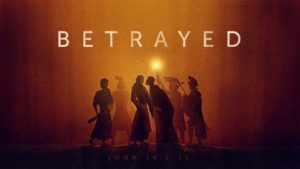
TODAY’S READING FROM THE OLD TESTAMENT- – 2 SAMUEL 14:1-15:22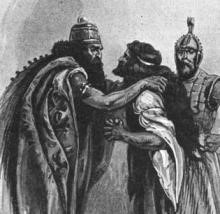
The events that follow David’s sin with Bathsheba have been referred to as a ‘trail of tears’. It started with David’s adultery that led to his murder of Uriah. It continued with the death of his firstborn son of Bathsheba. Then his daughter, Tamar, was raped by his son (Amnon). Amnon refused to follow the law and marry Tamar. David and Absalom are both outraged by the crime, but none deal with it according to God’s law. Absalom conspires to take revenge and kill Amnon at a sheep-shearing festival. Absalom, now a fugitive, flees to Gerar.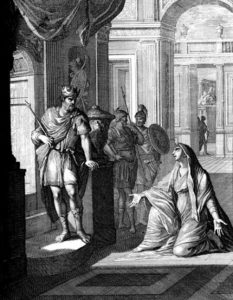
David, the father, and Absalom, the son, have been estranged from each other since Absalom ordered David’s eldest son’s death. Joab, David’s nephew, and the commander of David’s army seeks to expedite the reconciliation of David with Absalom. He orders a woman from Tekoa, who is known to be wise, to go to David pretending to be a widow who has two sons who got in a fight. There was no one there to intervene and separate them. One killed the other and other relatives wanted to kill her only surviving son, the only heir to her deceased husband’s inheritance. She pleads that the king intervene so that the avengers of blood would not continue to destroy the family’s hopes.
Once David gives his word to protect the murderer, the sole heir, the woman boldly points out the inconsistency of the King. Why would he act to protect the well-being of her family, when he does not act to protect the well-being of his own family, and that of the nation, by bringing back Absalom, the next in line to the throne?
What the woman says to David prophetically puts the gospel in view:
2 Samuel 14:14 14 “For we will surely die and are like water spilled on the ground which cannot be gathered up again. Yet God does not take away life but plans ways so that the banished one will not be cast out from him.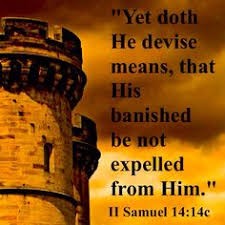
Our natural state as a result of Adam’s sin, is one of death and banishment. The law of God that upholds justice demands our banishment, eternal separation from Himself. But God, who is rich in mercy, and is all wise, has planned a way so that the banished one will not be cast off from Him! Jesus is that way! He is the way that those who have been banished and condemned under the law, can be reconciled and brought back to the Father!
Jesus is the way that the banished cannot be cast off forever.
David recognizes that this woman has been sent by Joab to manipulate the situation and influence him to bring Absalom back to Israel.
Absalom is invited back to Jerusalem but is in effect under house arrest for two years.
In the meanwhile, we learn of Absalom’s family, including the fact that he has a daughter whom he names after his sister, Tamar. We also learn that Absalom is still the attention-seeking politician. He sets Joab’s fields on fire to protest that Joab has not convinced the King to have a face to face meeting with him.
David does not call to see Absalom personally until two years have passed. When David does see his son, his heart is once again open to him. David kisses Absalom. It is a kiss of reconciliation.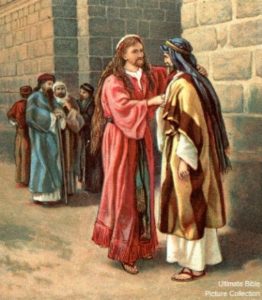
However, Absalom, once he is set free, uses his freedom to advance his egotistical quest for the throne. He meets with people outside the official palace walls, at the city gate. This is where anyone entering or leaving the city of Jerusalem must pass. Both local and national officials would meet there daily to discuss national policy and to conduct business. Absalom, good looking and acting the clever politician, knew how to work the crowd. He slanders the king’s character, misrepresents his father’s government, and suggests that there should be another king who would better represent the people, thinking, of course, of himself.
Absalom takes on Satan-like characteristics- pride, lying, cheating, destroying, opposing, and usurping the authority of the One duly appointed to rule.
Absalom is also a thief. Notice 2 Samuel 15:5b:
so, Absalom stole away the hearts of the men of Israel.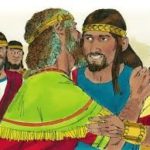
Absalom devises a plan to go to Hebron and have his supporters declare him to be king. Hebron is where his father David was first declared king. Absalom asks permission to go to Hebron under the pretense of fulfilling a vow to worship the Lord there. Secret messengers are sent to all the tribes instructing their members to proclaim “Absalom is king in Hebron” when they hear the sound of trumpets. 200 men from Jerusalem are invited to accompany Absalom to Hebron, not clearly knowing his intentions. Once in Hebron and offering sacrifices, he seeks to bolster his political power by summoning David’s counselor Ahithophel. Though a trusted friend of David, Ahithophel was the grandfather of Bathsheba, whom David had mistreated. Perhaps Absalom knew of some secret misgiving that Ahithophel had against David and used this to steal away his loyalty. Ahithophel betrays David and joins Absalom.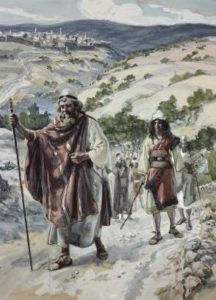
When David hears that the hearts of the men of Israel are now with Absalom, he decides to flee. He did not want to see the city destroyed or be forced to slay his own son.
With a heavy heart, David crosses the Kidron with all his men following. (This sadness is recorded in David’s Psalms. Many commentators believe that David’s exit from Jerusalem into the Kidron Valley is portrayed in Psalm 23. “Though I walk through the valley of death, Thou are with me.”)
The bitterness of Ahithophel’s betrayal is recorded by David in the Psalms.
Psalm 55:12-14 12 For it is not an enemy who reproaches me, Then I could bear it; Nor is it one who hates me who has exalted himself against me, Then I could hide myself from him. 13 But it is you, a man my equal, my companion and my familiar friend; 14 We who had sweet fellowship together Walked in the house of God in the throng.
Psalm 41:9 9 Even my close friend in whom I trusted, who ate my bread, has lifted up his heel against me.
Psalm 3 is also written about this experience: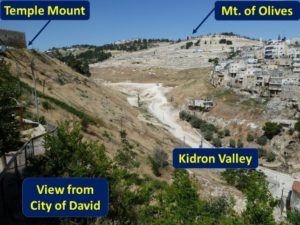
Psalm 3:1-4 1 A Psalm of David when he fled from Absalom his son:
O LORD, how my adversaries have increased! Many are rising up against me. 2 Many are saying of my soul, “There is no deliverance for him in God.” Selah. 3 But You, O LORD, are a shield about me, my glory, and the One who lifts my head. 4 I was crying to the LORD with my voice, And He answered me from His holy mountain. Selah.
David encourages Ittai to go back to the city and stay with King Absalom, as he had only recently come to Jerusalem and should not have to be put in a position of being an exile. Ittai, however, pledges his loyalty, “Wherever my lord the king may be, whether it means by life or death, there will your servant be.” (2 Sam 15:22).
So Ittai marches on with David who is once again the despised and rejected king.
TODAY’S READING FROM THE NEW TESTAMENT – JOHN 18:1-24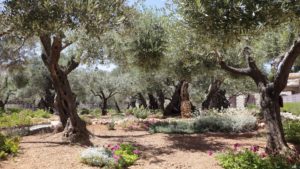
After the Passover meal, the Upper Room Discourse and after praying for His disciples and those who would believe their preached word, Jesus crosses the Kidron Valley to the Garden of Gethsemane where there is an olive grove. Gethsemane means ‘olive press’. Jesus is being oppressed by the forces at work in the world, the spirits of disobedience and Satan himself (Luke 22:2).
In this garden he will sweat drops of blood (Luke 22:44). His soul is deeply grieved to the point of death (Matthew 26:38).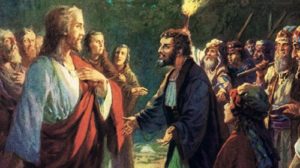
Judas’ familiarity with Jesus’ habits and favorite spots for prayer provide the intelligence needed for the Roman cohort, and officers from the priests and Pharisees, to arrest him in Gethsemane.
Jesus does not put up a fight. He asks the temple guard, “Whom do you seek?” When they reply, “Jesus the Nazarene”, Jesus replies and once again uses the Divine Name, “I AM” (John 18:5).
When He does so, the guards draw back and fall to the ground (John 18:6).
Jesus is the one who is in control here. He asks them again, “Whom do you seek?”. When they tell him that it is Jesus the Nazarene, Jesus asks that they let his disciples go safely, once again fulfilling His role as the Good Shepherd (John 18:8-9).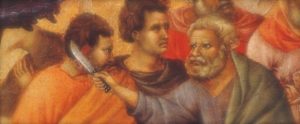
Peter in his characteristic zeal to defend Jesus, cuts off the ear of a member of the Roman guard named Malchus. Jesus reminds Peter that His betrayal into the hands of men is what He had told them about. His hour had come. This is the cup that He came to drink.
Jesus is bound and taken to the first of a series of trials. This one, according to Jewish law was illegal, taking place after official hours and without all needed parties present to make a fair judgement. They take Jesus to Annas, the ex-officio high priest. He had served in that office from A.D. 6 to 15 and then was deposed by Roman rulers. His son-in-law, Caiaphas was appointed high priest and held that office from 18 to 36/37 A.D. But according to Jewish law, the office of high priest was held for life, so even though Annas had been deposed by Roman authorities, the Jews continued to recognize him and allotted to him much authority, although Caiaphas would make the final decisions.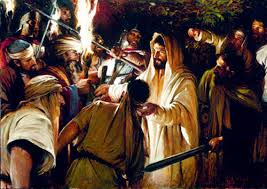
These men were evil. John points out that even with his murderous intention, Caiaphas had spoken prophetically when he said, “It was expedient for one man to die on behalf of the people” (John 18:15).
Once again John lets us know that he was a firsthand witness to these events because he was known by the high priest and therefore given access to the courtyard. John uses this favor to persuade a doorkeeper to let Peter in to warm himself by the fire.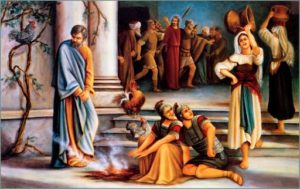
There, in the courtyard of Annas, Peter denies the Lord three times, just as Jesus had predicted that he would (John 18:17, 25, 27; Matthew 26:34, Mark 14:30; Luke 24:34; John 13:38).
Jesus is questioned about His teachings. Jesus reminded them that they had already heard what He had to say. He said that they should question those who heard him. One of the officers slapped Jesus, thinking him impertinent to answer the high priest that way. Jesus asks the officer to testify whether He had answered incorrectly.
Once again Jesus silences His accusers with His forthrightness. He is taken away bound to Annas’ son-in-law, the official high priest, Caiaphas.
TODAY’S READING FROM THE BOOK OF PSALMS- PSALM 119:97-112
Each verse in the next section of 8 verses, begins with the Hebrew letter ‘Mem’.
The Psalmist discloses his daily habit of Biblical meditation. He meditates upon the Word all day long. (Psalm 119:97). Do you believe it? Do you understand the enormous personal benefit?
Psalm 119:98 98 Your commandments make me wiser than my enemies, for they are ever mine. (They are ever with me! NIV, ESV)
Not only does his meditation upon God’s Word make him wiser than his enemies, but also wiser than his teachers! (119:99-100). He has been delivered from evil paths as he has attempted to follow God’s counsel. Through the Word he has learned to hate every wrong path (v.104).
What an appetite he has for God’s Word. Do you share his estimations of the Word’s value? Is the Word your treasure?
Psalm 119:103 103 How sweet are your words to my taste, sweeter than honey to my mouth!
The next section, each verse beginning with the letter ‘Nun’, continues to expound how important the Word of God is to the Psalmist.
Psalm 119:105 105 Your word is a lamp to my feet and a light to my path.
He recognizes his vulnerability in this world where there are so many snares.
His hope of personal victory is related to his purposeful pursuit of the Word’s teaching! His heart rejoices in this.
TODAY’S READING FROM THE BOOK OF PROVERBS- PROVERBS 16:8-9
Proverbs 16:8-9 8 Better is a little with righteousness than great income with injustice. 9 The mind of man plans his way, but the LORD directs his steps.
Here is another verse reminding us of what is most important in life, being in a right relationship with God and His Word, and recognizing as we make our plans, that God is in control.
PRAY FOR THE NATIONS-
Georgia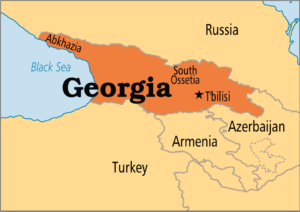
Sak’art’velo
Asia
Geography
Area: 69,700 sq. km
Black Sea state between the Caucasus Mountains and Turkey. Moderate climate with good natural resources and soil.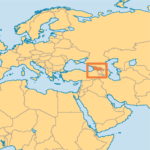
Population: 4,219,191 Annual Growth: -1.12%
Capital: T’bilisi
Urbanites: 52.9%
HDI Rank: 89 of 182 (UN Human Development Reports 2009)
Peoples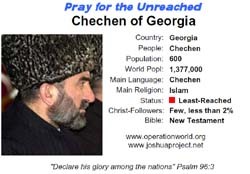
Peoples: 36 (36% unreached) All peoples
Unreached Peoples Prayer Card
Official language: Georgian Languages: 25 All languages
Religion
Largest Religion: Christian
|
Religion |
|
Pop % |
Ann Gr |
|
3,319,238 |
78.67 |
-1.2 |
|
|
65,247 |
1.5 |
-0.6 |
Challenges for Prayer
The Georgian Orthodox Church’s history stretches back to AD 150; it can be regarded as the world’s second-oldest Christian nation. Communist repression, infiltration and subversion brought both martyrdom and compromise. Since Communism’s collapse and Georgian independence, many have returned to the Church of their ancestors. Some minority groups converted as well. For most Georgians, this is mostly an expression of nationalism and cultural identity, not a living spiritual faith. Pray for access to the Word of God, and that through it many may find the Truth of the gospel. Pray also for renewal among Orthodox clergy; some small beginnings of this are occurring.
The small Protestant Church struggled under Communism and, since independence, at the hands of some factions of the Orthodox Church. Evangelical ministries have been repressed; their work maligned as sectarian. They have had problems acquiring buildings and the permits necessary to hold meetings. There have been incidents of meetings being broken up, sometimes violently, and materials confiscated. Some legal changes in 2005 offer hope of greater freedom of religious expression. Pray for a relationship of mutual respect and understanding between the Orthodox and other churches; pray that Protestant and Independent churches and believers might conduct themselves in Christ-like ways, even amid hostility.
PRAYER: O Lord, we make our appeal to Your mercies and the wisdom of Your Word. Keep us from snares. Even when we are in tough times and walking in what we recognize as the valley of the shadow of death, remind us of Your unfailing presence. You are our strength and our shield, and Your Word is our delight and a lamp to our feet. May we walk in the light that you give instead of warming ourselves at the popular fires of unenlightened opinion. Our hearts rejoice in the sure hope that You will complete the work You have begun in us. Give us courage to walk into the future with Your victory in view. In Jesus’ Name. Amen.
Pastor David
